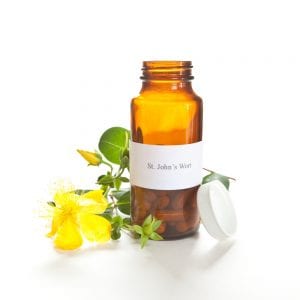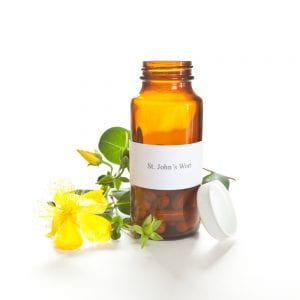Written by Harold Oster, MD. Results suggest that topically applied St. John’s Wort decreases symptoms in patients with knee osteoarthritis.
 Osteoarthritis affects more than two hundred million people worldwide. It causes the destruction of cartilage and bone, leading to pain, stiffness, and loss of function1. St. John’s wort has been used topically in traditional medicine for its anti-inflammatory properties2.
Osteoarthritis affects more than two hundred million people worldwide. It causes the destruction of cartilage and bone, leading to pain, stiffness, and loss of function1. St. John’s wort has been used topically in traditional medicine for its anti-inflammatory properties2.
Deniz Zeynep Sönmez et al. studied the effectiveness of a topically applied preparation of St. John’s wort in treating symptoms of knee osteoarthritis. Seventy-two participants over 35 years old with knee osteoarthritis were divided into a study and a placebo group. The treatment group applied St. John’s wort oil (olive oil infused with the flowering parts of St. John’s wort) to their knees three times daily for three weeks, while the placebo group applied plain olive oil. The participants were aware of which oil they received. Face-to-face interviews were performed at the beginning and end of the study to evaluate for covariables and to determine each participant’s subjective assessment of symptoms. Participants were assessed weekly for pain with the Visual Analog Scale (VAS), which provides scores ranging from zero (no pain) to 100 (severe pain)3. At the beginning and end of the study, the authors evaluated the participants with the Western Ontario and McMaster Universities Osteoarthritis Index (WOMAC), an osteoarthritis-specific measure of pain and disability. WOMAC includes three sub-scales: pain, which ranges from zero to twenty, stiffness, zero to eight, and physical function, zero to 68, with higher scores indicating more symptoms and limitations4.
The authors noted the following:
- Based on inclusion criteria, sixty participants completed the study.
- All participants had a VAS score of four or greater at study entry.
- The VAS score decreased by the end of the study in both groups but significantly more in the treatment group. (3.0 points vs 1.5 points)
- Pain decreased on the WOMAC score more in the study group than in the placebo group. (5.87 points vs 1.10 points)
- Stiffness improved more in the St. John’s wort group than in the placebo group. (2.60 points vs 0.67 points)
- Physical function improved more in the study group than in the placebo group. (16.17 points vs 4.00 points)
- A higher percentage of participants in the control group required painkillers than in the study group. (76.7% vs 50%)
- In the study group, most participants felt their symptoms had improved.
- No side effects were noted in either group.
Results suggest that topically applied St. John’s wort decreases pain, stiffness, and physical dysfunction in patients with knee osteoarthritis. The study’s limitations include its small size, short duration, and unblinded design.
Source: Sönmez, Deniz Zeynep, and Sultan Taşcı. “The Effect of St. John’s Wort Oil (Hypericum Perforatum L.) in Knee Osteoarthritis: A Randomized Controlled and Qualitative Study.” Pain Management Nursing (2024).
© 2023 American Society for Pain Management Nursing. Published by Elsevier Inc. All rights reserved.
Click here to read the full text study.
Posted June 4, 2024.
Harold Oster, MD graduated from medical school in Miami, Florida in 1992 and moved to Minnesota in 2004. After more than 25 years of practicing Internal Medicine, he recently retired. Dr. Oster is especially interested in nutrition, weight management, and disease prevention. Visit his website at haroldoster.com.
References:
- Katz JN, Arant KR, Loeser RF. Diagnosis and Treatment of Hip and Knee Osteoarthritis: A Review. Jama. Feb 9 2021;325(6):568-578. doi:10.1001/jama.2020.22171
- Radovanović K, Gavarić N, Aćimović M. Anti-Inflammatory Properties of Plants from Serbian Traditional Medicine. Life (Basel). Mar 24 2023;13(4)doi:10.3390/life13040874
- Delgado DA, Lambert BS, Boutris N, et al. Validation of Digital Visual Analog Scale Pain Scoring With a Traditional Paper-based Visual Analog Scale in Adults. J Am Acad Orthop Surg Glob Res Rev. Mar 2018;2(3):e088. doi:10.5435/JAAOSGlobal-D-17-00088
- Woolacott NF, Corbett MS, Rice SJ. The use and reporting of WOMAC in the assessment of the benefit of physical therapies for the pain of osteoarthritis of the knee: findings from a systematic review of clinical trials. Rheumatology (Oxford, England). Aug 2012;51(8):1440-6. doi:10.1093/rheumatology/kes043







Comments (0)